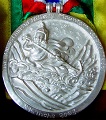
|
The Sir Edmund Hillary Mountain Legacy MedalHome Update Background Nomination Mountain Legacy Collaborate Sitemap Contact |
 |
Cornell University anthropologists David Holmberg and Kathryn March will receive the 2021 Sir Edmund Hillary Mountain Legacy Medal for their contributions to cultural preservation, social equity, and educational opportunity among mountain communities in Nepal.
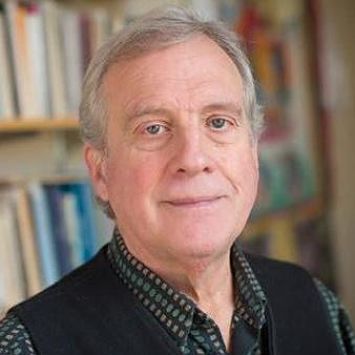
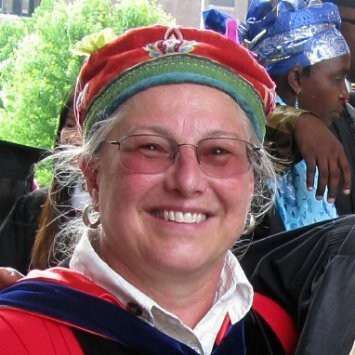
Kathyrn March and David Holmberg are a husband-and-wife team who for more than forty years have collaborated on research and educational exchange projects in Nepal. In collaboration with the Central Department of Anthropology at Tribhuwan University, they have created opportunities for both American and Nepali students. Using education as their fulcrum, they have leveraged creative development projects, notably a new ecotourism route focused on Kispang Rural Municipality and Phikuri Ridge in Nuwakot.
They also raised more than $50,000 for earthquake recovery and helped develop a quake-resistant architectural model in the wake of the devastating 2015 earthquakes.
Wakhi advocate and cultural preservationist Didar Ali will receive the 2019 Sir Edmund Hillary Mountain Legacy Medal for remarkable service in the conservation of culture and nature in mountainous regions.
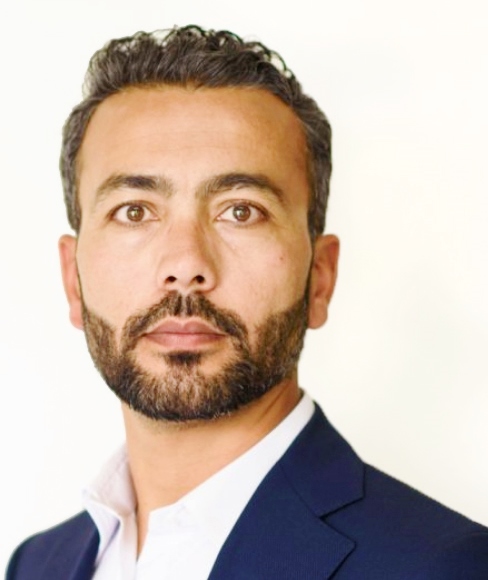
Mr. Ali is a native of Gulmit in the Upper Hunza of Gilgit-Baltistan in Pakistan. Gulmit (pop. 5000) is an ancient town, set amid mountains and glaciers, and the people are Khik (called Wakhi by outsiders). The language is related to ancient Farsi, and is spoken by a shrinking cohort in the Pamir region of Afghanistan, Tajikistan, Pakistan, and China.
For the past seven years, Mr. Ali has dedicated himself to the preservation and promotion of Wakhi culture and language. After completion of an MBA in Vienna, Austria, Mr. Ali returned to Gulmit and initiated a panoply of projects ranging from a cookbook of traditional Wakhi recipes to the first Wakhi language primer for school children; both of these projects were sponsored by the Aga Khan Rural Support Program.
As CEO of the non-profit Mountains & People, Didar Ali has been a leader in community tourism development, environmental protection, and development of modern employment opportunities for Wakhi youth through training in computer science and Internet marketing.
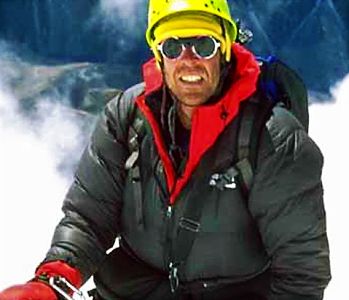
Mountain climber and humanitarian Dr. Daniel Mazur received the Sir Edmund Hillary Mountain Legacy Medal at the International Mountain Museum in Pokhara, Nepal, on 11 December 2018 (International Mountain Day) during the Nepal Mountaineering Association’s fifth annual Mountain Festival.
Mazur, who holds a doctorate in Social Policy Analysis from Brandeis University, is an accomplished climber with multiple ascents of Mount Everest and 8000-meter peaks, and is credited with several notable rescues of fellow climbers. His company, Summit Climbs, has led scores of expeditions in the Himalayas. At the same time, his Mount Everest Foundation for Sustainable Development has implemented numerous projects, including the renovation of Deboche convent just north of Tengboche, earthquake rescue and reconstruction, school and clinic development, and Sherpa climbing training programs. Currently, his top priority is the Mount Everest Biogas Project, which he cofounded with Garry Porter to mitigate the problem of human waste accumulating at elevation.
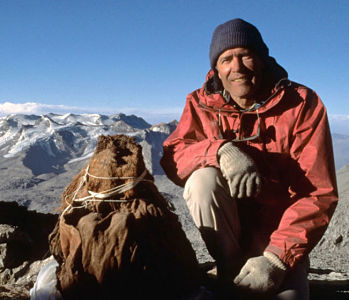
American anthropologist and mountain archeologist Dr. Johan Reinhard received the Sir Edmund Hillary Mountain Legacy Medal at the International Mountain Museum in Pokhara on Dec. 11, 2017 in conjunction with the NMA's Mountain Festival.
Dr. Reinhard has served as a National Geographic Explorer, Senior Fellow with The Mountain Institute, and (at the time of the award) Research Professor with Future Generations University. He has published groundbreaking research on sacred landscapes, notably relating to Tibetan Buddhist beyul (hidden valleys that helped form the basis of the Shangri-La legend), Himalayan shamanism, sacred lakes of the Aztecs and Incas, and mountain-top Inca burials.
Peruvian civil engineer César Portocarrero has designed and directed numerous projects to mitigate the danger of outburst floods from numerous glacial lakes in the Cordillera Blanca of the Andes, saving thousands of lives and many millions of dollars, and he is now sharing his expertise with members of the High Mountain Adaptation Partnership (HiMAP), including Nepal, Bhutan, and several Central Asian nations.
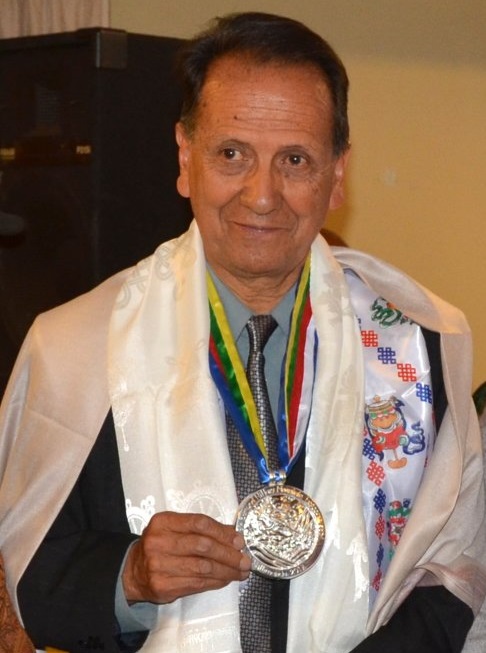
Increased incidence of GLOFs is not the only risk posed by climate change. Receding glaciers endanger the water supply on which mountain communities and downstream urban areas depend. Portocarrero has therefore worked with stakeholders to design mitigation projects that not only reduce the levels of swelling lakes but create and manage reservoirs, irrigation, water distribution, and drainage so as to use resources prudently and equitably. The projects go far beyond infrastructure: for instance, regional stakeholders must be educated in the efficient use of water, which entails in-depth meteorological training.
Mr. Portocarrero was presented with the Hillary Medal at a ceremony at the Hotel Tibet International in Kathmandu on December 11, 2016; he also appeared as the guest of honor at an ICIMOD Knowledge Forum on December 12.
Jack D. Ives, eminent montologist and Honorary Research Professor of Geography and Environmental Studies at Carleton University (Ottawa), has received the first Lifetime Achievement edition of the Sir Edmund Hillary Mountain Legacy Medal. The presentation took place on October 29, 2015, in Ottawa at an event hosted by the New Zealand High Commissioner to Canada.
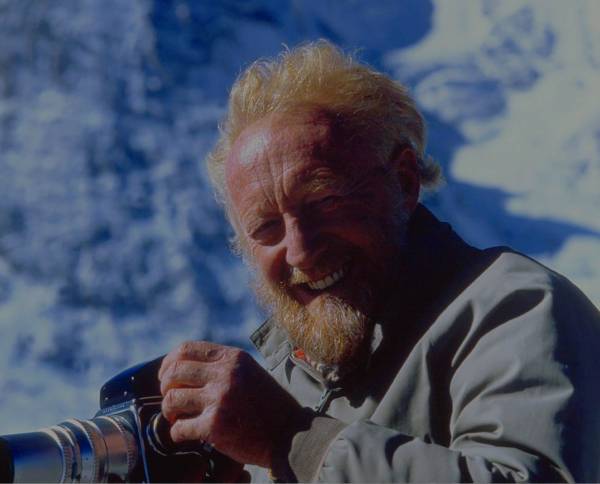
Montology is the interdisciplinary study of all aspects of mountains, including highland-lowland linkages, and focuses particularly on mitigating and managing disasters, improving stewardship of mountain ecosystems, and sustaining mountain livelihoods and culture.
Jack Ives had a distinguished career as a geomorphologist and glaciologist before broadening his interests to include areas usually associated with human geography, development and other fields. Early research focused on the onset of glaciation and dynamics of glacial movement, avalanche mapping, and impact of cloud seeding. Later projects have ranged from the development of community-based trekking tourism in Lijiang (Yunnan Province, China) to the first scientific study of Glacial Lake Outbreak Floods (GLOFs) and the initiation of efforts to reduce those hazards as well to mitigate the economic disruption of exaggerated claims regarding assumed imminent disasters. More
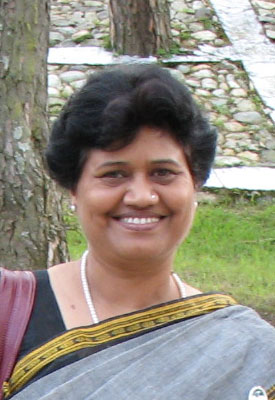
Professor of economics, and conservationist, and mountaineer Dr. Harshwanti Bisht has been selected to receive the Sir Edmund Hillary Mountain Legacy Medal.
In 1981 Harshwanti Bisht, Rekha Sharma and Chandra Prabha Aitwal were the first three women to summit the main peak of Nanda Devi (7,816m). Bisht was also a member of the Indian expedition to Mt. Everest, in 1984. However, the Hillary Medal is awarded for philanthropic achievements, not for sports achievements.
Since 1989 Dr. Bisht has labored to improve conditions in the Gangotri area of Uttarakhand, at the headwaters of the Ganges in northern India. Her Save Gangotri project has planted tens of thousands of saplings, organized eco-awareness campaigns, propagated endangered medicinal herbs, and introduced ecotourism standards to an area ravaged by climate change and unregulated pilgrimage.
Bisht has had remarkable success in restoring the birch forests around Gau Mukh (Cow Snout), the terminal area of Gangotri Glacier. As the forests take hold, they have an increasingly significant impact in increasing humidity and lowering local temperatures.
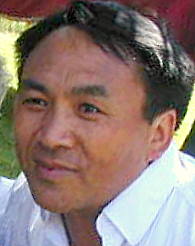
Ang Rita Sherpa, Senior Program Manager for The Mountain Institute, received the 2011 Sir Edmund Hillary Mountain Legacy Medal in the course of festivities for the Khumjung School Jubilee Celebration in Sagarmatha National Park on May 29, 2011. A native of Khunde, the village where Edmund Hillary established the only hospital in Nepal's Khumbu District, Mr. Sherpa has dedicated his career to the management of remote mountainous protected areas. His focus has been on conserving ecosystems while expanding sustainable livelihoods for mountain communities.
Ang Rita Sherpa was a key member of the task force that prepared for the establishment of Makalu-Barun National Park; his work included biological inventories, community consultation and boundary demarcation. In 1992, Mr. Sherpa was assigned to serve as Conservation Education, Tourism, and Natural Resource Officer for the Makalu-Barun National Park Project. In addition to initiating conservation education programs, he developed training program guidelines for local entrepreneurs, scouts and guides.
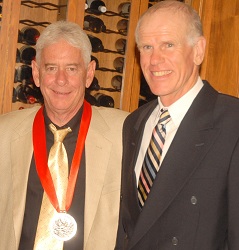
Scott MacLennan, founder and Executive Director of The Mountain Fund, received the 2010 Sir Edmund Hillary Mountain Legacy Medal at a dinner hosted by the RMIT University on November 17. The Medal was presented by Peter Hillary, son of the late Sir Edmund Hillary, and a world-class explorer and philanthropist in his own right.
MacLennan's work in Nepal includes the rehabilitation of two monasteries, the staffing of a public school, and the establishment of two clinics and a training hospital. Together with his wife Sunita Gurung, Scott runs a successful voluntourism programs, and mentors new NGOs around the world. MacLennan is currently engaged in an extraordinary leadership training program for Nepali girls and women called Her Farm. The residents run a self-sustaining agricultural enterprise and learn cutting-edge technology skills that establish them as role models for women and other marginalized groups.
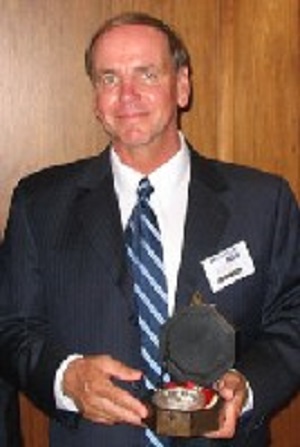
The 2006 Hillary Medal was awarded to Dr. Alton C. Byers for his outstanding achievements in applied conservation research in the Mt. Everest (Nepal), Makalu-Barun (Nepal), and Huascarán (Peru) national parks. Byers has a long and distinguished career specialising in integrated conservation and development programmes, applied research and the establishment of mountain-based educational courses and materials.
Dr. Byers has been a strong advocate of an approach incorporating applied research results into the design and implementation of conservation and community development programmes. This stems from his earlier research undertakings in Nepal, where he demonstrated that the lack of such an approach and absence of reliable information had led to misunderstandings regarding human impact on the environment.
Dr. Byers completed his studies at the University of Colorado at Boulder under the supervision of 2015 Hillary Medalist Jack D. Ives.
In 2008 Peter Hillary presented the second Hillary Medal to British national Anthony "Papa Tony" Freake. Over a span of two decades Papa Tony helped transform the Sherpa village of Phortse in Nepal.
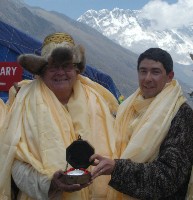
Phortse is a community of about 400 Sherpas in the Khumbu District of Nepal, perched on an isolated terrace approximately 3800 meters above sea level and about 15 km southwest of Mt. Everest. Papa Tony, as Mr. Freake is known locally, visited Phortse for the first time in 1989. In 1992, he undertook to build a house for the schoolteachers at Phortse, and since then his PCP has undertaken numerous development projects including a health clinic, hydroelectric plant and electricity supply system, Tibetan Buddhist monastery, youth club, drinking water supply system, multipurpose community building and educational scholarships.
According to Tony, his projects in Phortse have been directly modeled on the philanthropic work of Sir Edmund Hillary.
The first Sir Edmund Hillary Mountain Legacy Medal was awarded in May 2003 to Michael Schmitz and Helen Cawley, jointly, for their work on keystone cultural and ecological projects in the Solu-Khumbu districts of Nepal. These include the reconstruction and renovation of world-famous Tengboche and Tupten Choling monasteries.

Tengboche Monastery, the spiritual heart of the Sherpa homeland, was destroyed by fire in 1989 and the main structure was subsequently rebuilt. After the inauguration of the newly built monastery in 1994, at the request of the Abbot and the of the Nepalese government Schmitz undertook a survey to assess the needs of Tengboche in the face of ever increasing pressure from huge numbers of tourists. The Tengboche Development Master Plan has been the basis for subsequent fund raising and work undertaken in the area by Michael Schmitz and Helen Cawley.
Among the projects undertaken and completed are a new or improved drinking water supply system, sanitary facilities, satellite telephone, school system, porters' lodge, clinic, and visitor center.
Since 2001, Schmitz and Cawley have been working on the Thubten Choling Monastery Development Project near Junbesi at the request of His Holiness Trulshik Rinpoche, one of the teachers of the Dalai Lama. This monastery houses more than 300 monks who sought refuge there after fleeing Chinese oppression in Tibet. The project entails construction of a new large prayer hall, kitchen, dining hall, classrooms, printing press, libary, water system, toilets and hydo-power station.
|
Home
Please Support the Sir Edmund Hillary Mountain Legacy Medal |